EDITOR’S NOTE: The following three-part commentary by Heather Gray of Justice Initiative discusses the current Trump Administration policy of criminalizing Central and South American refugees who have amassed at the US southern border in the context of the history of US aggression, repression and counterinsurgency that has so destabilized countries such as Honduras (from which many of the refugees have travelled) that families with children have undertaken a dangerous journey of several thousand miles, on foot, to reach the United States. The recent death in US custody of a seven-year-old girl by dehydration and shock, and the callous response to her tragic death by Administration officials, should give us all pause to contemplate how far into the bowels of cruelty and Isfet (disorder, injustice, untruth, disharmony, imbalance, unrighteousness) the United States and its citizens are willing to descend. In the three installments below, including the text of a report narrated by actor and activist Susan Sarandon and an April 2015 report by Ramona Wadid, Ms. Gray discusses some of the history of the School of the Americas (now named the Western Hemisphere Institute for Security Cooperation or WHINSEC) and its destabilization of Latin America, which human rights activists say is the real cause of the current migration of refugees to the United States.
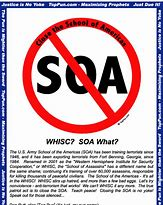 Part I: Refugees: “Blaming the Victims”
Part I: Refugees: “Blaming the Victims”
Heather Gray [hmcgray@earthlink.net]
December 15, 2018
Justice Initiative
Foreword
Donald Trump consistently blames refugees for wanting to enter the United States from Central America for what is most likely the result of United States military training and policies in the area that have led to death, destruction, destabilization and loss and/or lack of civil liberties. No doubt, these refugees have good reason to leave their countries. Yet, Trump continues to inappropriately blame these victims.
U.S. policies? Much of the destabilization in Central America comes from its military, many of whom have been trained in the United States. One of the issues is that there are parallels with the training of the foreign military in the United States with the philosophy of the U.S. domestic FBI’s COINTELPRO (1956-1971) program (Counter Intelligence Program). CONTELPRO targeted activists in the U.S. such as Martin Luther King, H. Rap Brown and countless others in the U.S. who struggled and organized for justice in America.
COINTELPRO continues to target activists in the United States under the guise of what is now known as BIE – Black Identity Extremists. The U.S. international training of military continues to incorporate this directive of targeting civil rights, human rights, environmental, and other activists.
What is the primary goal of COINTELPRO and US militarization domestically and internationally? It is for money/resources. As Major General Smedley Butler had wisely stated in the 1930’s, the military services and war serve at the behest of corporate America and the goal therefore, is to establish an environment that allows corporate entities to have control to exploit and/or have access to resources for their financial benefit. No one states this issue better than Butler. Here are his comments from the 1930’s.
Butler also famously eulogized his own career as follows:
“I spent 33 years and four months in active military service and during that period I spent most of my time as a high class muscle man for Big Business, for Wall Street and the bankers. In short, I was a racketeer, a gangster for capitalism. I helped make Mexico and especially Tampico safe for American oil interests in 1914. I helped make Haiti and Cuba a decent place for the National City Bank boys to collect revenues in. I helped in the raping of half a dozen Central American republics for the benefit of Wall Street. I helped purify Nicaragua for the International Banking House of Brown Brothers in 1902-1912. I brought light to the Dominican Republic for the American sugar interests in 1916. I helped make Honduras right for the American fruit companies in 1903. In China in 1927 I helped see to it that Standard Oil went on its way unmolested. Looking back on it, I might have given Al Capone a few hints. The best he could do was to operate his racket in three districts. I operated on three continents.” (American History USA)
The South American military are being trained in the U.S. not on the pretext of protecting or advancing democratic principles. Instead, they are trained in the U.S. to make their own country amenable to American corporate interests.
America’s Early Colonial History and LIC
In the 20th and 21st centuries, U.S. policies around the world, both economically and militarily, have been questionable at best. U.S. international military aggression outside of the Americas began with the Philippines in the beginning of the 20th century with the Philippine/American War (1898-1902). After the war, the U.S. launched its Low-Intensity Conflict (LIC) program in the Philippines with the creation of the Philippine Constabulary. The Philippine Constabulary is, even today, a national police organization created principally to protect American and Filipino corporate and military elite interests.
In 1987, Philippine scholar Walden Bello, who has written extensively about LIC, stated:
In a very real sense the current battle is merely “round four” of the confrontation between the U.S. imperial power and Philippine nationalism that began in 1898. Threading through the continuing conflict has been the insurgents’ goal of liberating the country from domination by the United States. When the nationalist element is joined to the lower classes’ struggle for land and equality, as it has been in the Philippines, then the revolutionary enterprise has turned out to be both explosive and enduring. And the costs of mounting a counterinsurgency campaign are getting progressively higher.
U.S. intervention in the Philippines also has a broader significance in third world affairs. Given its status as a quasi-colony, the Philippines has, in the past, enjoyed the dubious distinction of serving as America’s principal proving ground for developing and testing strategies and tactics for low intensity conflict (LIC). America’s first major overseas LIC engagement, the Philippine-American War, allowed the U.S. Army free rein to develop and test a variety of counterinsurgency tactics that are still emulated today. Fifty years later, in the early 1950s, there was an effort to transfer to Vietnam some of the lessons that the United States had gained in the struggle against the Huk guerrillas in the Philippines. Today, the Philippines, together with Central America, serves as a laboratory for experimenting with LIC tactics, which have been revitalized and revised after the debacle in Vietnam. (Walden Bello)
I witnessed the impact of this U.S. targeted ‘violence’ training while in the Philippines in 1989, which, in addition to the Philippine Constabulary, has also had many of its military trained in the U.S. What I witnessed in the Philippines was paramilitary groups, funded by the United States, that were killing and/or threatening, for example, union leaders and those working on behalf of the poor, including liberation Catholic priests, one of whom I met who was in hiding at the time.
Liberation theologians have been targeted by the LIC-U.S. trained military primarily because these theologians take a stand against the oppressive capitalist infrastructure. Liberation theology originally focused in Latin America but spread to other countries as well. Here is a description of the concept:
Liberation theology, religious movement arising in late 20th-century Roman Catholicism and centered in Latin America. It sought to apply religious faith by aiding the poor and oppressed through involvement in political and civic affairs. It stressed both heightened awareness of the “sinful” socioeconomic structures that caused social inequities and active participation in changing those structures. Liberation theologians believed that God speaks particularly through the poor and that the Bible can be understood only when seen from the perspective of the poor. They perceived that the Roman Catholic Church in Latin America was fundamentally different from the church in Europe…(Britannica)
On-Going U.S. International “Low-Intensity Conflict” Policies
Regarding LIC in South America, we need, again, to consider the U.S. School of the Americas (SOA) or what is now referred to as the Western Hemisphere Institute for Security Cooperation (WHINSEC). Founded in 1946, it is located in Fort Benning, Georgia. In this school, the United States trains the military of South American countries to serve a somewhat similar role as the Philippine Constabulary and/or even more violent and extreme, if that’s possible.
It could also be said that the WHINSEC in the U.S. is training the South American military to oppress their own people. So, through this LIC policy, instead of the United States military going into El Salvador, Honduras, Columbia, Argentina, etc. the U.S. trains troops from these countries to serve the interests of the United States and the friendly elite of the South American countries. Again, it is a “policing” or “militarization” of countries in what the United States considers its corporate empire of interest.
Here is briefly some information about SOA/WHINSEC from Lesley Gill. Lesley Gill is Professor of Anthropology and Department Chair, Vanderbilt University. She is the author of Teetering on the Rim: Global Restructuring, Daily Life, and the Armed Retreat of the Bolivian State; Precarious Dependencies: Gender, Class, and Domestic Service in Bolivia; and Peasants, Entrepreneurs, and Social Change: Frontier Development in Lowland Bolivia.
Located at Fort Benning in Columbus, Georgia, the School of the Americas (soa) is a U.S. Army center that has trained more than sixty thousand soldiers and police, mostly from Latin America, in counterinsurgency and combat-related skills since it was founded in 1946. So widely documented is the participation of the School’s graduates in torture, murder, and political repression throughout Latin America that in 2001 the School officially changed its name to the Western Hemisphere Institute for Security Cooperation. Lesley Gill goes behind the façade and presents a comprehensive portrait of the School of the Americas. Talking to a retired Colombian general accused by international human rights organizations of terrible crimes, sitting in on classes, accompanying SOA students and their families to an upscale local mall, listening to coca farmers in Colombia and Bolivia, conversing with anti-SOA activists in the cramped office of the School of the Americas Watch-Gill exposes the School’s institutionalization of state-sponsored violence, the havoc it has wrought in Latin America, and the strategies used by activists seeking to curtail it.
Based on her unprecedented level of access to the School of the Americas, Gill describes the School’s mission and training methods and reveals how its students, alumni, and officers perceive themselves in relation to the dirty wars that have raged across Latin America. Assessing the School’s role in U.S. empire-building, she shows how Latin America’s brightest and most ambitious military officers are indoctrinated into a stark good-versus-evil worldview, seduced by consumer society and the “American dream,” and enlisted as proxies in Washington’s war against drugs and “subversion.”
One example, below, of these human rights violations is by the SOA graduate General Juan Orlando Zeped from El Salvador who took a course at the SOA in 1975 on “Urban Counterinsurgency Ops”; and in the 1969, the “Unnamed Course.” Below is some information about General Zeped’s tragic behavior:
Jesuit massacre, 1989: (Zeped) Planned the assassination of 6 Jesuit priests and covered-up the massacre, which also took the lives of the priests’ housekeeper and her teen-age daughter. (United Nations Truth Commission Report on El Salvador, 1993) Other war crimes, 1980’s: The Non-Governmental Human Rights Commission in El Salvador also cites Zeped for involvement in 210 summary executions, 64 tortures, and 110 illegal detentions. (Committee in Solidarity with the People of El Salvador) Member of the “La Tandona” and held the rank of colonel and served as the Vice Minister of Defense at the time of the massacre. Prior to the massacre he publicly accused the UCA of being the center of operations for the FMLN and was present for the meetings where orders were given for the massacre. He was later promoted to the rank of general (Notorious Grads – School of the Americas).
Summary
Donald Trump should begin to resolve all this so-called refugee dilemma by first, letting these refugees into the United States; secondly, by closing the Western Hemisphere Institute for Security Cooperation (WHINSEC) in Columbus, Georgia that has trained and taught the military in these countries; and thirdly by ending this kind of ‘Low-Intensity Conflict’ training altogether in the United States and elsewhere.
We are also witnessing now an increased militarization of domestic police forces in the U.S., and there is significant organizing in the U.S. against this trend of police militarization and gun violence overall. This activism needs to also be extended as well to the countries throughout the world that are continuing to be victims of these U.S. ‘Low-Intensity Conflict’ policies and training. Closing down the ‘Western Hemisphere Institute for Security Cooperation’ would be a good first start.
After all, most of this domestic and international violence is being conducted thanks to American tax dollars and/or by the controlling corporate elite.
Martin Luther King was certainly correct when saying “injustice anywhere is a threat to justice everywhere” by inferring that none of us are immune to these injustices.
Part II: Refugees, “Blaming the Victims”
Note: The transcribed 1995 interview below offers more of a background of the ‘School of the Americas’, otherwise known as the ‘School of the Assassins’. This interview offers a better understanding of what the refugees attempting to come to the United States have had to contend with thanks to the training and philosophy their own military have had in the United States.
Narrated by Susan Sarandon, it includes comments by the following: Representative Joseph Kennedy, Maryknoll Father Roy Bourgeois, Archbishop Oscar Romero, Rufina Amaya (survivor of the El Mazote massacre), Representative Joseph Mokely, Vicky Imerman, Representative John Lewis, Unidentified El Salvadoran woman.
Heather Gray [hmcgray@earthlink.net]
December 15, 2018
Justice Initiative
School of the Americas: School of Assassins
“Here is the School of the Americas. It’s a combat school. Most of the courses revolve around what they call ‘counter-insurgency warfare.’ Who are the ‘insurgents?’ We have to ask that question. They are the poor. They are the people in Latin America who call for reform. They are the landless peasants who are hungry. They are health care workers, human rights advocates, labor organizers. They become the insurgents.
“They are seen as ‘the enemy.’ They are those who become the targets of those who learn their lessons at the School of the Americas.”
–Father Roy Bourgeois
Maryknoll World Productions (1995: 13 minutes)
Narrated by Susan Sarandon
Transcribed by Darrell G. Moen
Information Clearinghouse
TRANSCRIPT
Susan Sarandon: In the late afternoon of December 4, 1980, an unmarked grave was found in a field in El Salvador. When it was opened in the presence of the U.S. ambassador, it revealed the bodies of four women: Maryknoll Sisters Mara Clark and Eda Ford, Ursaline Sister Dorothy Kazel, and lay missionary Jean Donovan.
Of the five officers later found responsible for the rape and murder of these women, three were graduates of the United States Army School of the Americas. According to the Pentagon, the mission of the school is to train the armed forces of Latin America, promote military professionalism, foster cooperation among multinational military forces, and to expand the trainees’ knowledge of United States customs and traditions.
The School of the Americas originated in 1946 in Panama. Now, it is located on the grounds of Fort Benning, Georgia. The school teaches commando operations, sniper training, how to fire an M-16, and psychological warfare. Since no major declared war between Latin American countries has occurred in decades and the communist threat has vanished, why provide this kind of training?
Representative Joseph Kennedy: If you look at the course ranges that are offered to these individuals, they in fact are a dedicated way of teaching military leaders in foreign nations how to subvert their local communities.
Susan Sarandon: Since it opened, more than 55,000 military officials from 23 Latin American and Caribbean countries have trained at the school. About 2,000 students a year. As facts have emerged about the school and its graduates, it has drawn the attention of a growing number of human rights activists, such as Maryknoll Father Roy Bourgeois.
Maryknoll Father Roy Bourgeois: Just down the road here is the School of the Americas. It’s a combat school. Most of the courses revolve around what they call “counter-insurgency warfare.” Who are the “insurgents?” We have to ask that question. They are the poor. They are the people in Latin America who call for reform. They are the landless peasants who are hungry. They are health care workers, human rights advocates, labor organizers. They become the insurgents. They are seen as “the enemy.” They are those who become the targets of those who learn their lessons at the School of the Americas.
Susan Sarandon: What has been learned about the lessons taught at the school? In the 1980s, the civil war in El Salvador became a focal point for human rights activists throughout the world. Death squads operated freely, often killing 50 people a night. There were so many cases that on March 23, 1980, Archbishop Oscar Romero in San Salvador made a plea to the military leaders of his country.
Archbishop Oscar Romero: I would like to make an appeal in a special way to the men of the army. In the name of God, in the name of the suffering people whose laments rise to the heaven each day more tumultuous, I ask you, I order you in the name of God, stop the repression.
Susan Sarandon: While celebrating mass the next day, Archbishop Romero was assassinated. A number of years later, the National Security Archives in Washington D.C. made an important discovery when they obtained a copy of a declassified cable, Cape Dole.
Woman working at the National Security Archives: These two cables are both from the American Embassy in El Salvador.
One is from Dean Hinton, who was then Ambassador to El Salvador in 1981. And it discusses a meeting during which Roberto D’Aubuisson plans the murder of Archbishop Romero. During the meeting, there is described a lottery that the people who are attending the meeting hold to see who would draw the “right” to kill Romero himself.
Susan Sarandon: D’Aubuisson was trained at the School of the Americas. Also trained at the school were two of the three officers directly responsible for the assassination.
December 11, 1981: El Mazote, a small village in El Salvador…
Rufina Amaya (survivor of the El Mazote massacre): First, they forced everyone out of their houses and made us all lie face down in the street, both men and women. There were soldiers on both sides. Then, they moved away to see the women kneeling down on the ground to pray. They killed all of them. Not a single one of them survived, just me by the grace of God. I hid under a tree. When I heard the screams of the children, and I knew which ones were mine, they were crying, “Mommy, they’re killing us.”
Susan Sarandon: Over 900 men, women, and children were massacred. Virtually the entire population of the village and the area surrounding El Mazote. Out of 143 bodies identified in the laboratory, 131 were of children under the age of 12, including three infants under the age of three months. Ten of the 12 officers cited as responsible for the El Mazote massacre were graduates of the School of the Americas.
They were members of the Atlacatl Battalion, a part of the El Salvador Army.
November 16, 1989: San Salvador. Six Jesuit priests, their housekeeper, and her 15-year-old daughter were slaughtered. To get the facts about this incident, a U.S. Congressional Investigation began, led by Representative Joseph Mokely.
Representative Joseph Mokely: I went down [to El Salvador]. I talked with the Embassy, talked with the military, talked with the unionists. I had meetings set up in very dingy places to talk with people who didn’t want to talk to me in public. And we gathered enough information that we pushed the investigation to the degree that it was concluded and the people who perpetrated the crime were found guilty. The killing was done by the Atlacatl Battalion which is the crack [best] battalion in that country. And these are the people, some of them had just returned from the United States, where they were taught a course on “human rights” amongst other things.
Susan Sarandon: Nineteen of the 26 officers implicated in the Jesuit murders were graduates of the school, including Yushi Renee Mendoza, the lieutenant in charge of the squad that killed the Jesuits and the two women. He attended a commando course a year before the massacre took place.
Representative Joseph Mokely: The Truth Commission to the U.N. substantiated everything that I had brought forward.
Susan Sarandon: The United Nations Truth Commission Report released on March 15, 1993, cited specific officers for committing atrocities during the El Salvador civil war. At School of the Americas Watch just outside Fort Benning, Georgia, Vicky Imerman matched the names cited in the U.N. Report with names in a United States Government document.
Vicky Imerman: What I did was I took these officers, all the officers listed in the report and I looked them up in list of graduates of the School of the Americas which we received through the Freedom of Information Act. What I found were 49 of the 60-some officers listed were graduates of the School of the Americas. These officers attended the school both before and after they committed atrocities. Francisco Del Cid, right here, was on the Commandant’s List a couple of years after he ordered the massacre of about 16 civilians and had their corpses burned.
Susan Sarandon: El Salvador is only part of the school’s story. In the entry area of one of its main buildings are photographs of those the school honors, its so-called Hall of Fame. At the top of the list, Hugo Banzer, former dictator of Bolivia, a graduate of the school. Some of the others similarly honored are the former dictators of Honduras, Ecuador, and Argentina. And generals from eight other Latin and Caribbean nations, many cited by human rights groups for involvement in human rights abuses in their own countries.
Among other graduates, Manuel Noriega, former president of Panama, currently in prison in the United States. Four of the five ranking Honduran officers who organized death squads in the 1980s as part of Battalion 316, are graduates. Half of the 250 Columbian officers cited for human rights abuses attended the school. The three highest ranking Peruvian officers convicted in February 1994 of murdering nine university students and a professor were all graduates. Also, the Peruvian army commander who brought out tanks to obstruct initial investigation of the murders.
During the dictatorship of the Somoza family [in Nicaragua], over 4,000 National Guard troops graduated from the school. Many of them later became known as the “Contras,” responsible for the deaths of thousands of Nicaraguan peasants in the 1980s. The general in charge of Argentina’s so-called “Dirty War” was a school graduate. During that internal conflict in the late-1970s and early-1980s, an estimated 30,000 people were tortured, disappeared, and murdered.
General Hector Gramajo of Guatemala was the featured speaker at the school’s graduation ceremonies in 1991. Human rights groups claim he is the architect of strategies that legalized military atrocities in Guatemala resulting in the death of over 200,000 men, women, and children.
Maryknoll Father Roy Bourgeois: As a Catholic priest, as a U.S. citizen, I really feel a responsibility to speak out against that because of this [school]. This does not lead to healing, it leads to death and suffering. In a way, this is a death machine. And this, I want to say, is very close to home because it’s in our backyard. It’s not out there in El Salvador. This is not in South Africa. We’re talking about a school of assassins right here in our backyard being supported and financed through our tax money. It’s being done in our names.
Susan Sarandon: $30 million of U.S. taxpayer money was recently spent to renovate school headquarters and these housing units for soldiers attending the school.
Vicky Imerman: It’s an outrage. It’s the use of our tax dollars, American tax dollars, for what I think your average American feels is a distinctly un-American purpose.
Susan Sarandon: On September 30, 1993, the School of the Americas was debated by Congress for the first time in its history. It happened when an amendment to the Defense Department budget was introduced by Congressman Joseph Kennedy.
Congressman Joseph Kennedy: Mr. Speaker, my amendment would reduce the Army operation and maintenance account by $2.9 million, the amount dedicated to running the Army School of the Americas at Fort Benning, Georgia. The intent of this amendment is to close the school.
Representative John Lewis: Why should we continue to fund and condone military-inspired murder? Why should we continue to train thugs to kill their own people? Vote for peace. Vote for non-violence. Vote for harmony. Vote for the Kennedy Amendment.
Susan Sarandon: 174 voted in favor, 256 against.
Congressman Joseph Kennedy: We’re only 30 or 40 votes short of winning. That means that if people around the country hear about this and write their congressman, we can win. This is an issue that we can win on.
Maryknoll Father Roy Bourgeois: And what’s very important right now I feel is to let out voices be heard. Bishop Romero said it best before he was assassinated by someone who trained at the School of the Americas. He said, “We who have a voice, we have to speak for the voiceless.” I realize that we here in this country have a voice. We can speak without having to worry about being disappeared or tortured or being picked by [by the police or military]. We can speak, and I just hope that we can speak clearly and boldly on this issue.
Susan Sarandon: In April 1994, a group of human rights activists from around the country began a 40-day fast on the steps of the U.S. Capitol. They were there to make their case for shutting down the School of the Americas. The day before the fast ended, Congressman Kennedy joined them in a press conference.
Congressman Joseph Kennedy: The so-called Hall of Fame in Georgia is nothing more than a Hall of Shame for the people of our country. We, as a nation and as a people have a right and an obligation to say what we believe in in terms of how our dollars are going to be spent. What we are saying unequivocally is that we do not want to be associated with the kinds of individuals that are torturing, maiming, and killing innocent people throughout Latin America. That’s what this bill is all about and that’s what your commitment is all about, and we commit to working until this bill is passed.
Susan Sarandon: The next day, Congressman Kennedy’s second effort to shut the school was defeated by a smaller margin than his first one. 175 voted for his amendment, 217 against.
Unidentified El Salvadoran woman: I’m not very educated, but in my simple words I think that the only thing the School of the Americas has accomplished is the destruction of our countries in Latin America. Don’t give us any more of that military aid. It would be better to help the poor who are in need.
Maryknoll Father Roy Bourgeois: We need the voices of others, and we also need those letters to congressional leaders. To let them know that we will not allow them to use our money to run a school of assassins.
(In accordance with Title 17 U.S.C. Section 107, this material is distributed without profit to those who have expressed a prior interest in receiving the included information for research and educational purposes. Information Clearing House has no affiliation whatsoever with the originator of this article nor is Information Clearing House endorsed or sponsored by the originator.)
Part III: Refugees: “Blaming the Victims”
Note: When the ‘School of the Americas’ was changed to the ‘Western Hemisphere Institute for Security Cooperation’ (WHINSEC), there was hope the mission would have changed as well but the whole thing appears to be a hoax as assassins are still being exported from the school, as described in the article below. But here is a brief description of the name change:
The Western Hemisphere Institute for Security Cooperation (WHINSEC) is a United States Department of Defense Institute located at Fort Benning near Columbus, Georgia, created in the 2001 National Defense Authorization Act. It was formerly known as the US Army School of the Americas, but was renamed in 2000 so Congress could claim they’d shut S.O.A. down (see below under SOA Watch). (Wikipedia)
Heather Gray
December 15, 2018
Justice Initiative
The School Of The Americas Is Still Exporting Death Squads
South American militaries have been sending soldiers to the U.S. for “ethics” and “human rights” training for years, but history shows that many of these alumni go on to become notorious torturers and murderers, not defenders of peace. Ramona Wadib
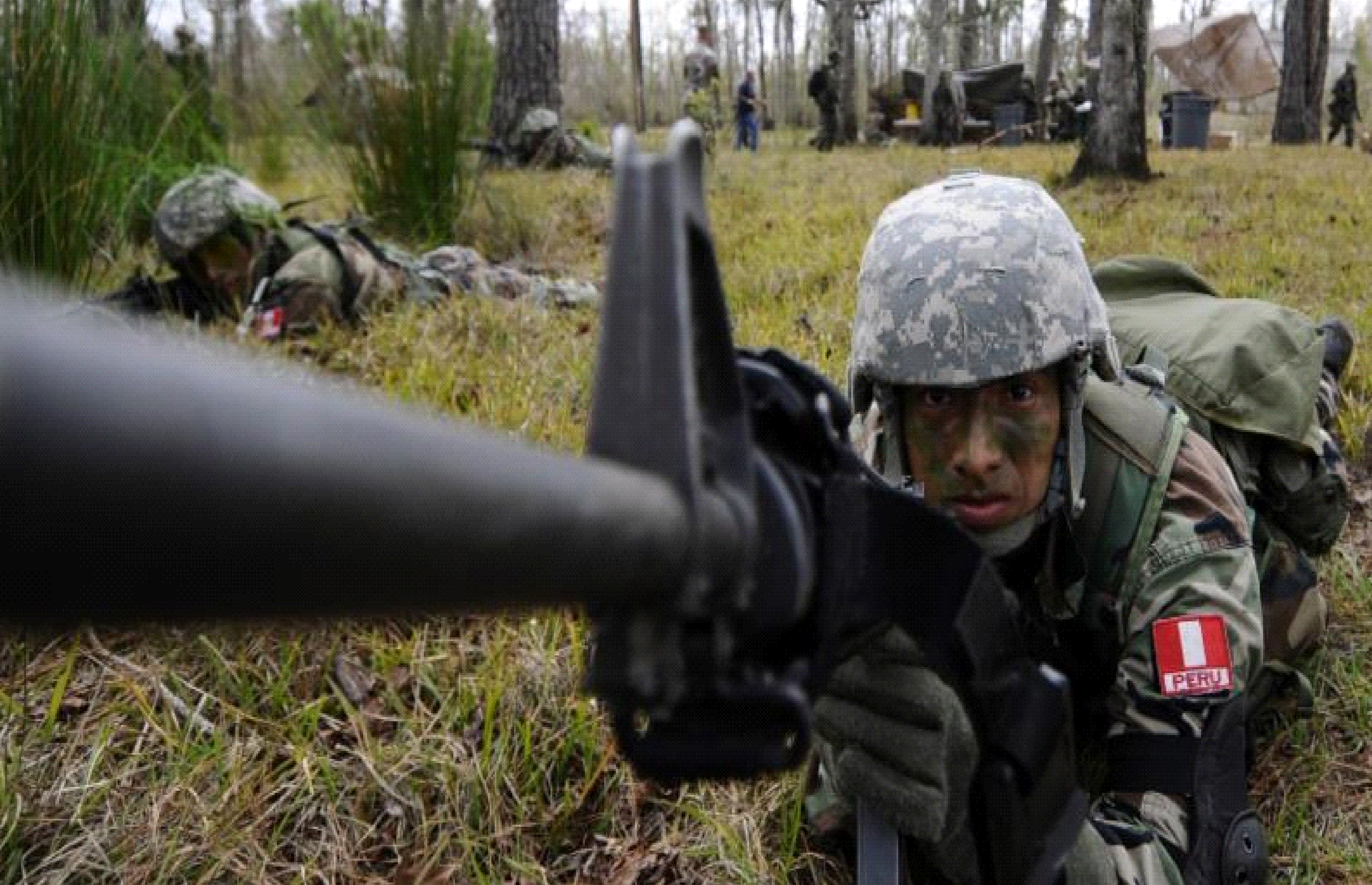
Students from the Western Hemisphere Institute for Security Cooperation (formerly School of the Americas) and students from the Naval Small Craft Instruction and Technical Training School conduct a joint assault on a simulated narcotics camp during a field training exercise. (Photo: U.S. Navy)
April 22nd, 2015
By Ramona Wadib
Mint Press News
RABAT, Malta – In 2009, just a year before Sebastián Piñera became president of Chile, Michelle Bachelet approved the training of 211 Chilean recruits at the Western Hemisphere Institute for Security Cooperation (WHINSEC), formerly known as the School of the Americas (SOA).
Between 1999 and 2010, Chilean governments sent a total of 1,205 recruits to the school, with Bachelet remaining at the helm of cooperation with the U.S.-based institute that has graduated scores of alumni involved in human rights violations under Chile’s dictatorship era from 1973 to 1990.
Despite the macabre reality inflicted upon Chileans during Augusto Pinochet’s dictatorship, the Concertación governments of the center-left, allegedly embarking upon a democratic future for Chile, retained ties with the school that produced torturers such as Miguel Krassnoff Martchenko, who, according to torture survivors, never concealed his identity while subjecting his victims to brutality.
Bachelet’s father, Gen. Alberto Bachelet, who was loyal to socialist president Salvador Allende, was tortured to death by the Dirección de Inteligencia Nacional (the National Intelligence Directorate, also known as DINA). Bachelet herself was detained and tortured by DINA, later fleeing into exile and returning back to Chile in 1979.
Under Bachelet’s first presidency (2006-2010), Chilean cooperation with the U.S. expanded, especially following her one-year stay at Fort Lesley J. McNair, in Washington, D.C., which provided the prelude to Bachelet’s military and surveillance investment.
Socialism quickly eroded into opportunism, with the country’s first female president emphasizing Pinochet’s legacy of oblivion as she extended diplomatic maneuvers to former DINA torturers, even praising generals allegedly involved in the torture that contributed to her father’s death.
Piñera also sent recruits to train at WHINSEC and furthered U.S. military collaboration in 2012 by opening a military training center at Fort Aguayo in Concón, Chile.
From the SOA to WHINSEC
Established in 1946 in Panama, the SOA was responsible for training over 64,000 South American soldiers, many of whom later became notorious torturers and murderers in death squads. According to former Panamanian President Jorge Illueca, the SOA was the “biggest base for destabilization in Latin America.”
Expelled from Panama in 1984, the SOA relocated to Fort Benning, Georgia, and was renamed WHINSEC in 2001, allowing for an apparent termination of the previous program through dissociation. In reality, however, WHINSEC retained its SOA foundations and the U.S. Department of Defense has shielded the institute from criticism and outcry with regard to the school’s historical link to human rights violations.
In its mission statement, WHINSEC claims to have been founded upon the Charter of the Organization of American States and pledges to “foster mutual knowledge, transparency, confidence, and cooperation among the participating nations and promote democratic values, respect for human rights, and knowledge and understanding of U.S. customs and traditions.”
These values, according to WHINSEC’s website, are imparted through a three-lesson Ethics Program, as well as the Democracy and Human Rights Program – the latter dealing with “the universal prohibitions against torture, extrajudicial executions and forced disappearances.”
A far cry from protecting human rights
CIA and U.S. Army manuals detailing torture techniques translated into Spanish and utilized by the SOA are a far cry from anything containing human rights protections. Indeed, as SOA Watch explains, “These manuals advocated torture, extortion, blackmail and the targeting of civilian populations.”
The manuals, written in the 1950s and 1960s, “were distributed for use in countries such as El Salvador, Guatemala, Ecuador and Peru, and at the School of the Americas between 1987 and 1991.” Indeed, in-depth research and testimony from torture survivors relay more than just a depiction of torture practiced by SOA graduates in South America during dictatorship eras, such as Chile under Pinochet. Sadistic torture practiced upon detainees at Abu Ghraib is also reflective of the CIA torture manuals and torture previously carried out on detainees in South America.
Since 2000 and the renaming of the SOA, other crimes linked to SOA graduates have come to light.
Col. Byron Lima Estrada was convicted in June 2001 of murdering Guatemalan Bishop Juan Jose Gerardi following the publication of a report insisting the Guatemalan army was responsible for the murder of almost 200,000 people in the civil war that took place from 1960 to 1996.
Two SOA graduates, Venezuelan Army Commander in Chief Efrain Vasquez and Gen. Ramirez Poveda, were involved in the failed 2002 coup against President Hugo Chávez. According to SOA Watch, Otto Reich, then-assistant secretary of State for Western Hemisphere Affairs, was “appointed as a WHINSEC board of visitor member to ‘oversee’ democracy and human rights curriculum, as well as operations at the school.” Reich was also deeply involved in the planning of the coup against Chávez.
In 1999, Bolivian Captain Filiman Rodriguez had been found responsible for the kidnapping and torture of Waldo Albarracin, director of the Bolivian Popular Assembly of Human Rights. In 2002, Rodriguez was accepted for a 49-week officer training course at WHINSEC.
In May 2014, a detailed report by the Fellowship of Reconciliation and Colombia-Europe-U.S. Human Rights Observatory highlighted U.S. military assistance to Colombia between 2000 and 2010. According to the report, which studies extrajudicial killings committed by the Colombian Army Brigades, U.S. intelligence assistance to Colombia “supported units that had adopted a strategy conducive to extrajudicial killings.”
Colombia requires its officers to undergo training at WHINSEC. The 2014 report states that out of 25 Colombian graduates from 2001 to 2003, 12 had either been charged with “a serious crime or commanded units whose members had reportedly committed multiple extrajudicial killings.”
It should be remembered that Plan Colombia, signed by U.S. President Bill Clinton, was translated into “moral and political support” by Colombian Gen. Mario Montoya. Between 2000 and 2010, U.S. assistance was considered a factor which influenced the staggering total of 5,673 extrajudicial killings – all of which occurred with impunity, lack of judicial mechanisms, rewards for the murders and the role of national leaders such as Montoya providing a safety net for those complicit in the atrocities.
As regards WHINSEC in Colombia, an academic on the Board of Visitors is quoted in the report as stating, “So if a student of mine leaves an ethics class and engages in criminal activity does that make me or my university liable for her activity?”
This attitude summarizes the lack of accountability surrounding WHINSEC. The dissociation from the school’s history under its original name – the SOA – is merely a premise for distancing the institution from the atrocities committed by its students and graduates.
History, however, tells a different story. While WHINSEC continues to emphasize what it describes as a commitment to human rights by citing a mere eight hours of instruction in the subject, research, such as the report on Colombia’s extrajudicial killings, reveals a reality that goes beyond the cosmetic reforms employed by the institution.
Like this:
Like Loading...
 The end of March brought news of the senseless, tragic death of Los Angeles Hip Hop artist Ermias Davidson Asghedom, more famously known as “Nipsey Hu$$le”. Gunned down in front of the Marathon apparel and music store he had founded and built, his murder has shocked friends, fans and followers alike. Two other victims in the shooting survived. The many celebrities, from Dr. Dre to Jay-Z to Charlamagne Tha God, have expressed their shock at this murder and their condolences to his family. Some of the initial news reports can be found at The Blast (https://theblast.com/nipsey-hussle-dead/) and The Grio (https://thegrio.com/2019/03/31/breaking-rapper-nipsey-hussle-shot-and-killed-outside-of-los-angeles-store/).
The end of March brought news of the senseless, tragic death of Los Angeles Hip Hop artist Ermias Davidson Asghedom, more famously known as “Nipsey Hu$$le”. Gunned down in front of the Marathon apparel and music store he had founded and built, his murder has shocked friends, fans and followers alike. Two other victims in the shooting survived. The many celebrities, from Dr. Dre to Jay-Z to Charlamagne Tha God, have expressed their shock at this murder and their condolences to his family. Some of the initial news reports can be found at The Blast (https://theblast.com/nipsey-hussle-dead/) and The Grio (https://thegrio.com/2019/03/31/breaking-rapper-nipsey-hussle-shot-and-killed-outside-of-los-angeles-store/).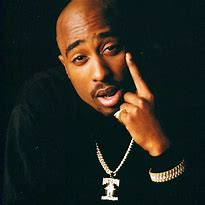 rap album and his performance at the 2019 Super Bowl, nearly parallels those of others who have rocketed to fame for their artistic talents but were later cut down
rap album and his performance at the 2019 Super Bowl, nearly parallels those of others who have rocketed to fame for their artistic talents but were later cut down 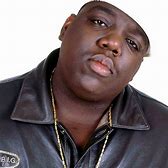 either because of their fame of because of their commitment to lifting up their communities. On the national front, the names Tupac “2Pac” Shakur and Christopher “Biggie Smalls/Notorious B.I.G” Wallace are the best known, but these tragedies play out far too often in every city,
either because of their fame of because of their commitment to lifting up their communities. On the national front, the names Tupac “2Pac” Shakur and Christopher “Biggie Smalls/Notorious B.I.G” Wallace are the best known, but these tragedies play out far too often in every city, 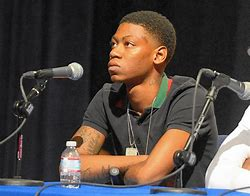 and their impact on local communities is just as traumatic. In Baltimore, Maryland, Tyriece Trayvon “Lor Scoota” Watson (left), 23, was gunned down on June 25, 2016 on his way from a community peace rally (“Killing of Baltimore rapper Lor Scoota — ‘one of the voices of the city’ — stuns community”, The Baltimore Sun,
and their impact on local communities is just as traumatic. In Baltimore, Maryland, Tyriece Trayvon “Lor Scoota” Watson (left), 23, was gunned down on June 25, 2016 on his way from a community peace rally (“Killing of Baltimore rapper Lor Scoota — ‘one of the voices of the city’ — stuns community”, The Baltimore Sun,  https://www.baltimoresun.com/news/maryland/crime/bs-md-ci-rapper-shooting-20160626-story.html). Dominic “Nick Breed” Grant (right), 24, “who advocated for nonviolence and whose lyrics often reflected the city’s trauma”, was killed October 21, 2018 (“Rapper whose lyrics reflected Baltimore’s pain fatally shot”, https://baltimore.cbslocal.com/2018/10/23/rapper-whose-lyrics-reflected-baltimores-pain-fatally-shot/). Washington, DC-area rapper Theodore
https://www.baltimoresun.com/news/maryland/crime/bs-md-ci-rapper-shooting-20160626-story.html). Dominic “Nick Breed” Grant (right), 24, “who advocated for nonviolence and whose lyrics often reflected the city’s trauma”, was killed October 21, 2018 (“Rapper whose lyrics reflected Baltimore’s pain fatally shot”, https://baltimore.cbslocal.com/2018/10/23/rapper-whose-lyrics-reflected-baltimores-pain-fatally-shot/). Washington, DC-area rapper Theodore  Dashawn “30 Glizzy” Pigford (left), 26, “a nice young man with a promising career,” according to attorney John McKenna, who had represented him in court, was shot and killed September 6, 2017 in South Baltimore (https://www.baltimoresun.com/news/maryland/crime/bs-md-ci-30-glizzy-killed-20170907-story.html).
Dashawn “30 Glizzy” Pigford (left), 26, “a nice young man with a promising career,” according to attorney John McKenna, who had represented him in court, was shot and killed September 6, 2017 in South Baltimore (https://www.baltimoresun.com/news/maryland/crime/bs-md-ci-30-glizzy-killed-20170907-story.html). 
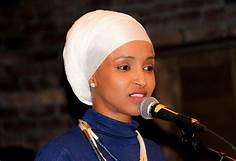
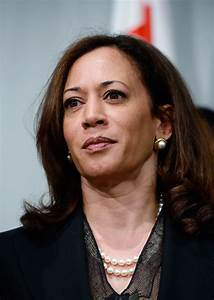 Meanwhile, Ms. Omar has her defenders in Congress and the Senate. US Senators and 2020 presidential candidates Elizabeth Warren (D-Massachusetts), Kamala Harris (D-California) and Bernie Sanders (I-Vermont) have expressed their concerns about the fervor with which Ms. Omar has been targeted. One article detailing this was written by Filipa Ioannou (“Kamala Harris defends Ilhan Omar after backlash to Israel comments”, Wednesday, March 6, 2019;
Meanwhile, Ms. Omar has her defenders in Congress and the Senate. US Senators and 2020 presidential candidates Elizabeth Warren (D-Massachusetts), Kamala Harris (D-California) and Bernie Sanders (I-Vermont) have expressed their concerns about the fervor with which Ms. Omar has been targeted. One article detailing this was written by Filipa Ioannou (“Kamala Harris defends Ilhan Omar after backlash to Israel comments”, Wednesday, March 6, 2019; 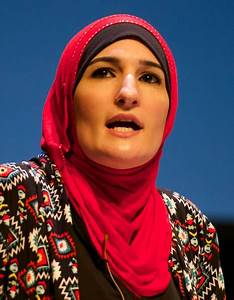 “Democrats are playing in to the hands of the right,” she wrote. “Dividing our base and reinforcing their narrative and giving them an easier path towards 2020… You want a resolution? Condemn all forms of bigotry. All forms of bigotry are unacceptable. We won’t let them pin us up against each other. We stand with Representative Ilhan Omar. Our top priority is the safety of our sister and her family.”
“Democrats are playing in to the hands of the right,” she wrote. “Dividing our base and reinforcing their narrative and giving them an easier path towards 2020… You want a resolution? Condemn all forms of bigotry. All forms of bigotry are unacceptable. We won’t let them pin us up against each other. We stand with Representative Ilhan Omar. Our top priority is the safety of our sister and her family.”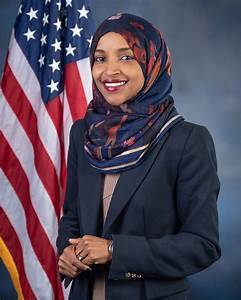

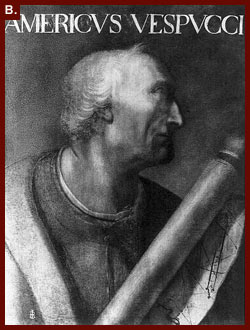
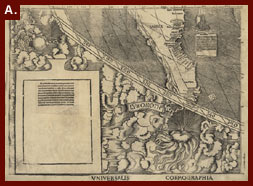 For more than 350 years the map was housed in a 16th century castle in Wolfegg, in southern Germany. The introduction to Waldseemüller’s “Cosmographie” is in the Library’s Rare Book and Special Collections Division. This extremely rare work contains the first suggestion that the area of Columbus’ discovery be named “America” in honor of Amerigo Vespucci, who recognized that a “New World,” the so-called fourth part of the world, had been reached through Columbus’ voyage. Before that time, there was no name that collectively identified the Western Hemisphere. The earlier Spanish explorers referred to the area as the Indies believing, as did Columbus, that it was a part of eastern Asia. The Vespucci Family Papers are housed in the Library’s Manuscript Division.
For more than 350 years the map was housed in a 16th century castle in Wolfegg, in southern Germany. The introduction to Waldseemüller’s “Cosmographie” is in the Library’s Rare Book and Special Collections Division. This extremely rare work contains the first suggestion that the area of Columbus’ discovery be named “America” in honor of Amerigo Vespucci, who recognized that a “New World,” the so-called fourth part of the world, had been reached through Columbus’ voyage. Before that time, there was no name that collectively identified the Western Hemisphere. The earlier Spanish explorers referred to the area as the Indies believing, as did Columbus, that it was a part of eastern Asia. The Vespucci Family Papers are housed in the Library’s Manuscript Division.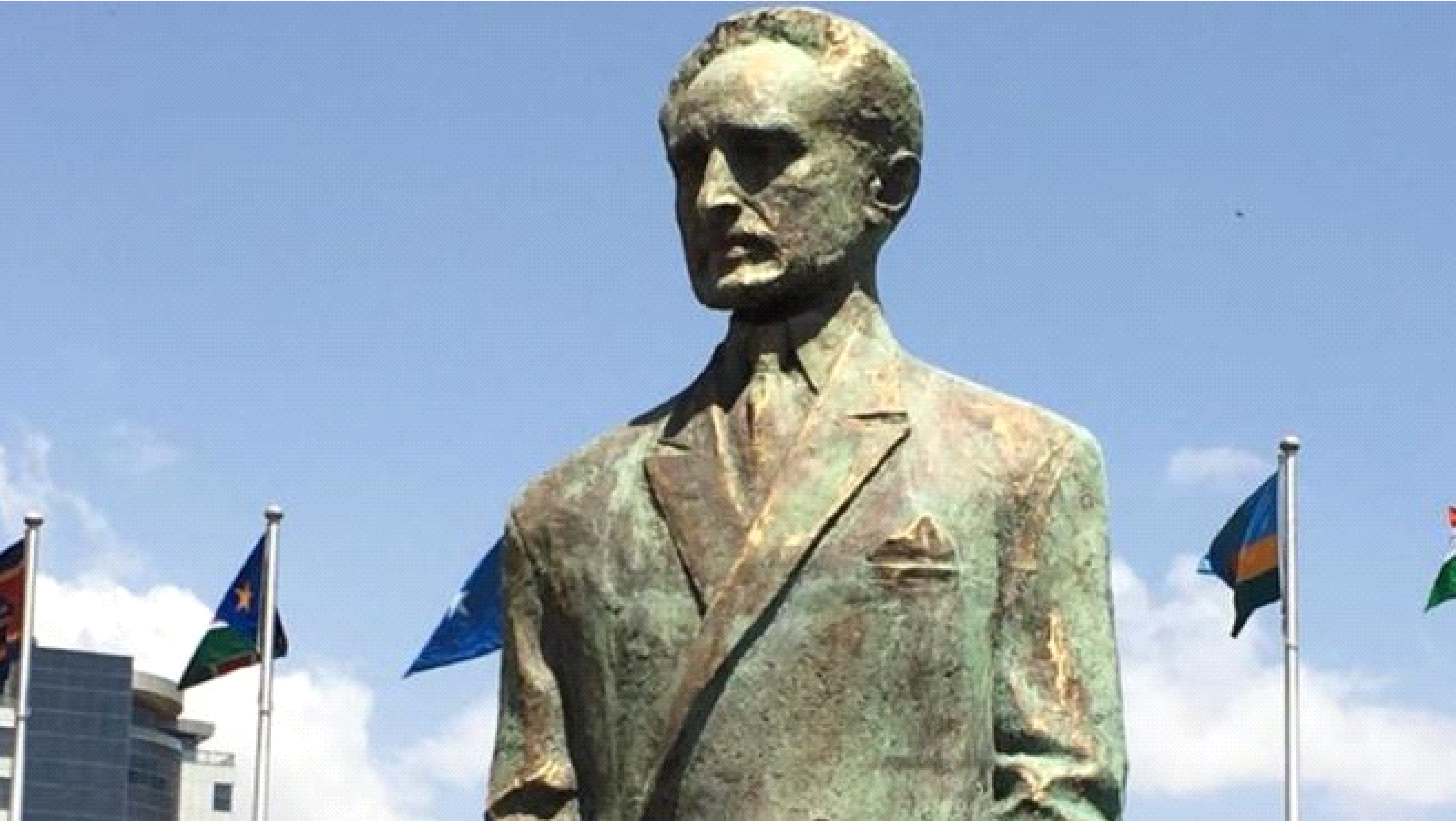
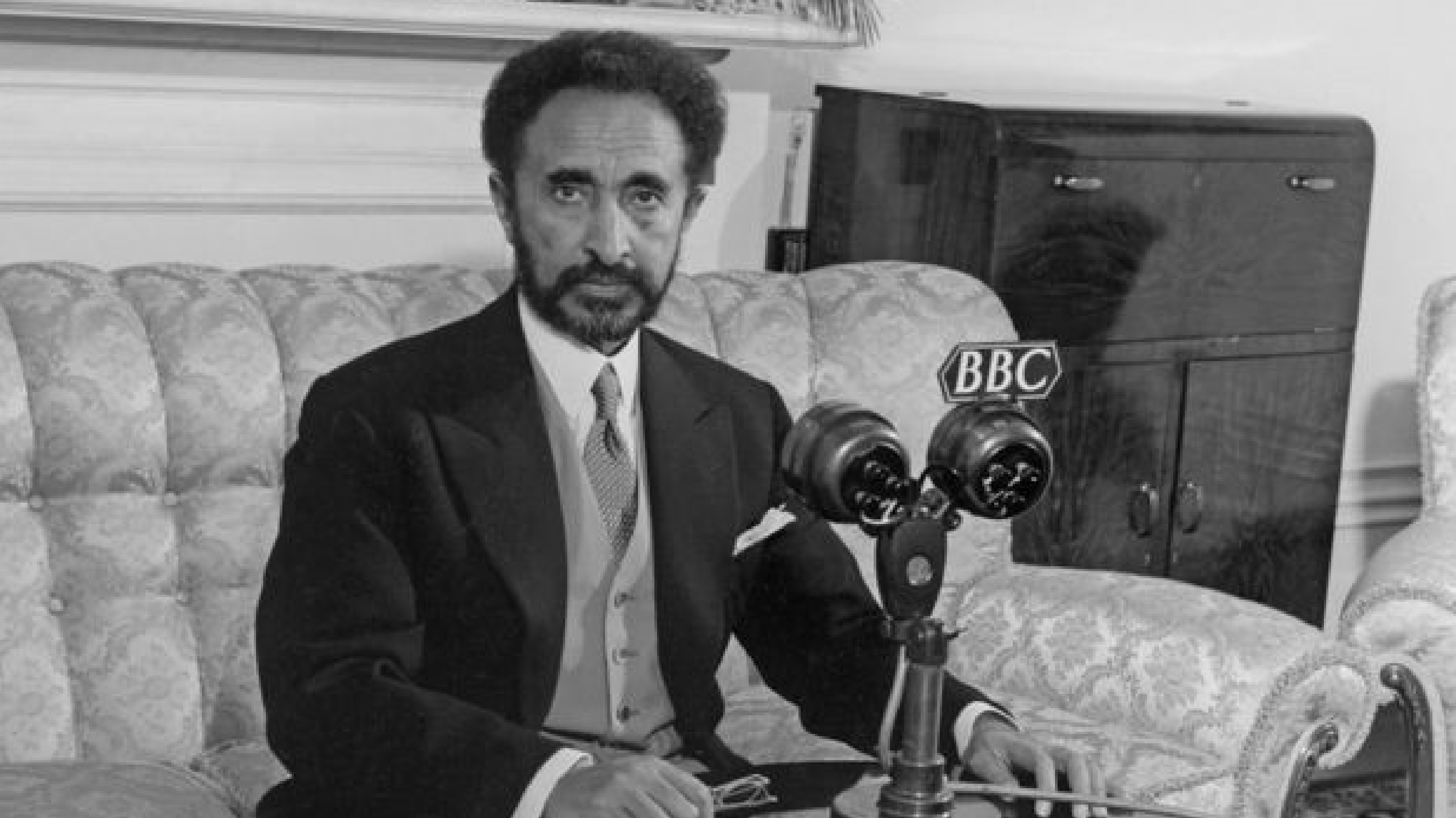 As it happened, the OAU ceased to exist in its original form in 2002, replaced by the African Union (AU).
As it happened, the OAU ceased to exist in its original form in 2002, replaced by the African Union (AU).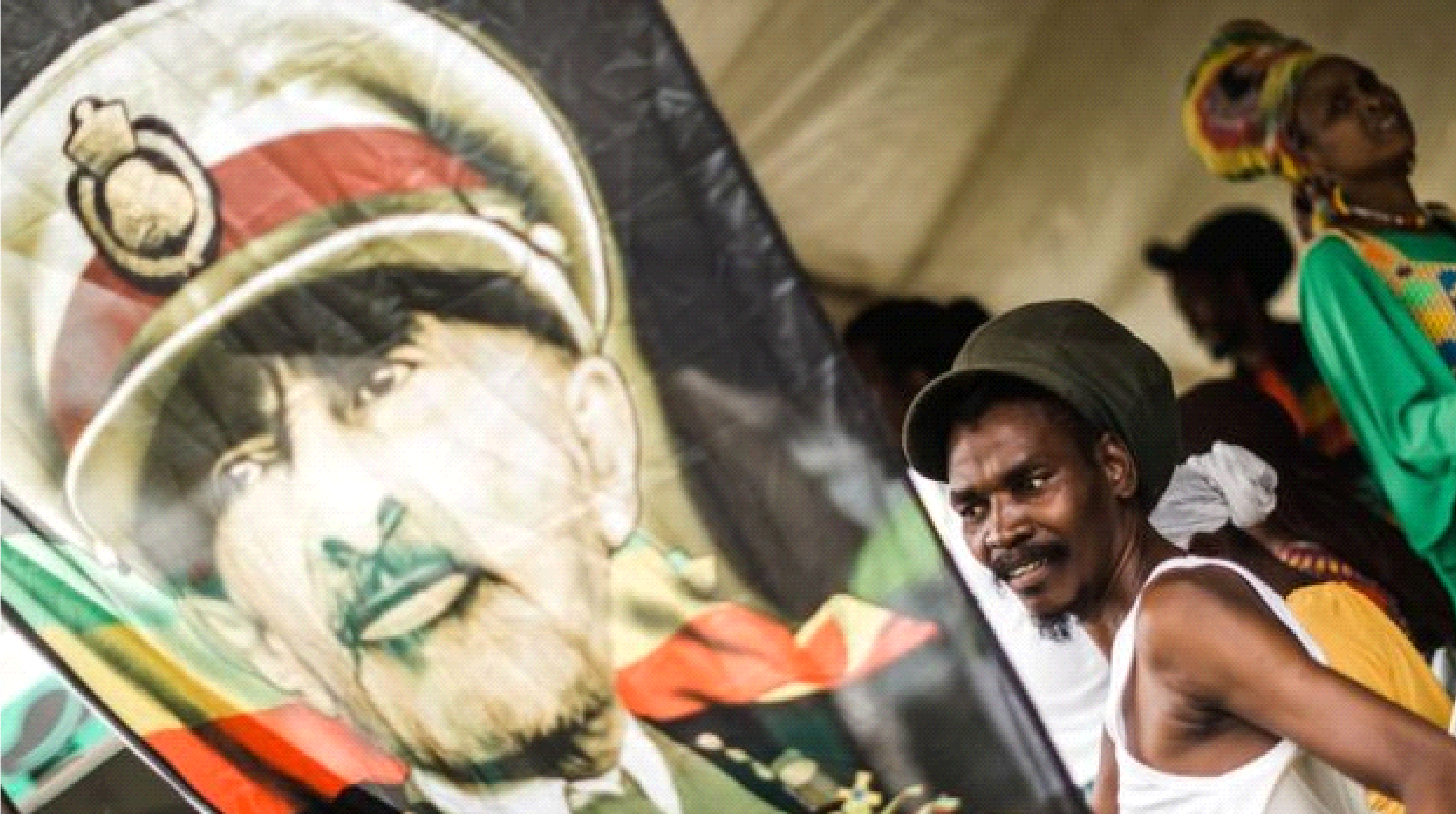 So, when a black man called Ras Tafari was crowned in Ethiopia, many saw that as a sign the prophecy had come true.
So, when a black man called Ras Tafari was crowned in Ethiopia, many saw that as a sign the prophecy had come true.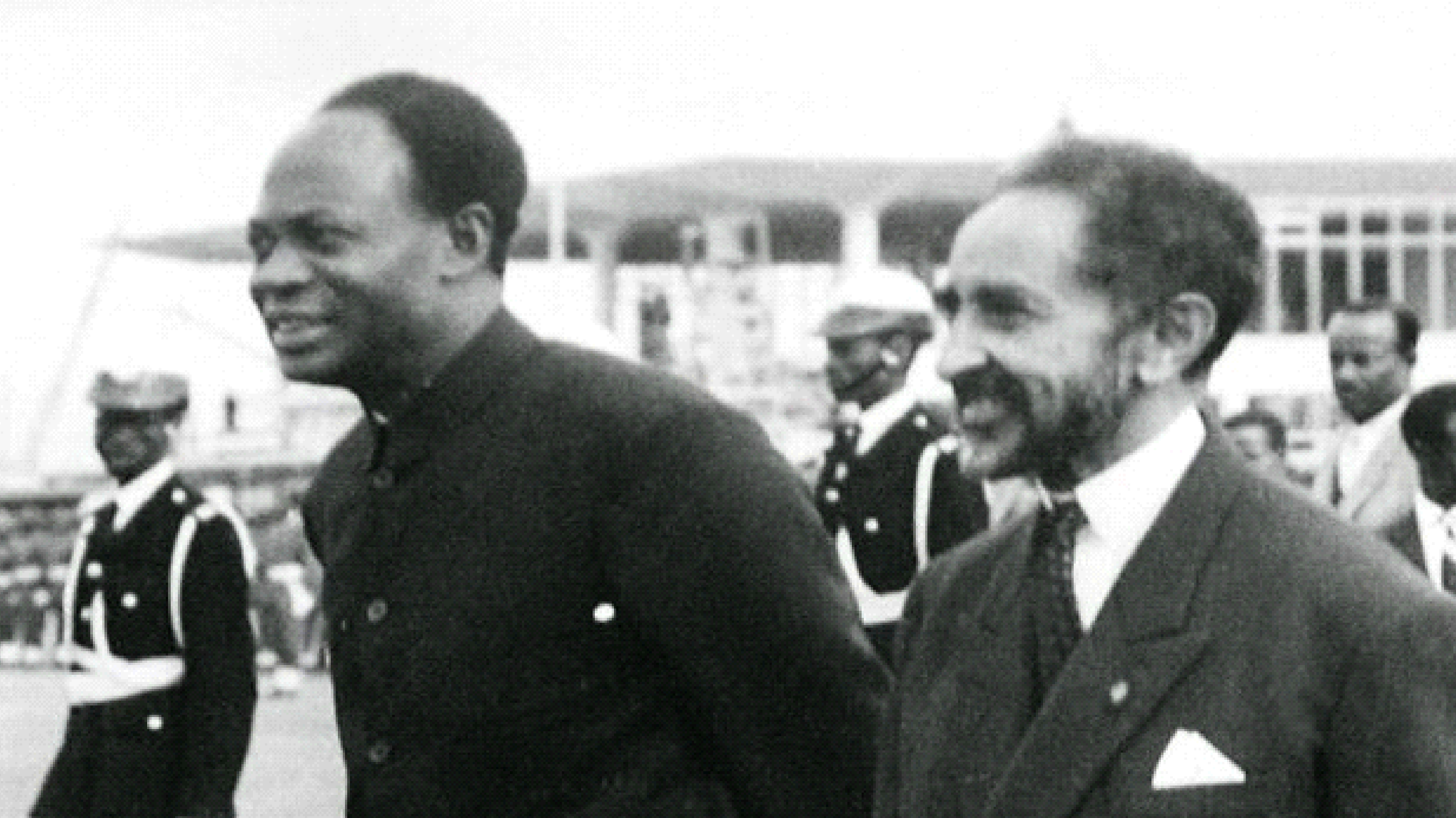 Marcus Garvey was unimpressed after he fled Ethiopia in 1936 following the invasion of Benito Mussolini’s troops a year earlier, describing Selassie as a “coward” and calling him out for “the terrors of slavery”. The practice was not outlawed in Ethiopia until 1942.
Marcus Garvey was unimpressed after he fled Ethiopia in 1936 following the invasion of Benito Mussolini’s troops a year earlier, describing Selassie as a “coward” and calling him out for “the terrors of slavery”. The practice was not outlawed in Ethiopia until 1942.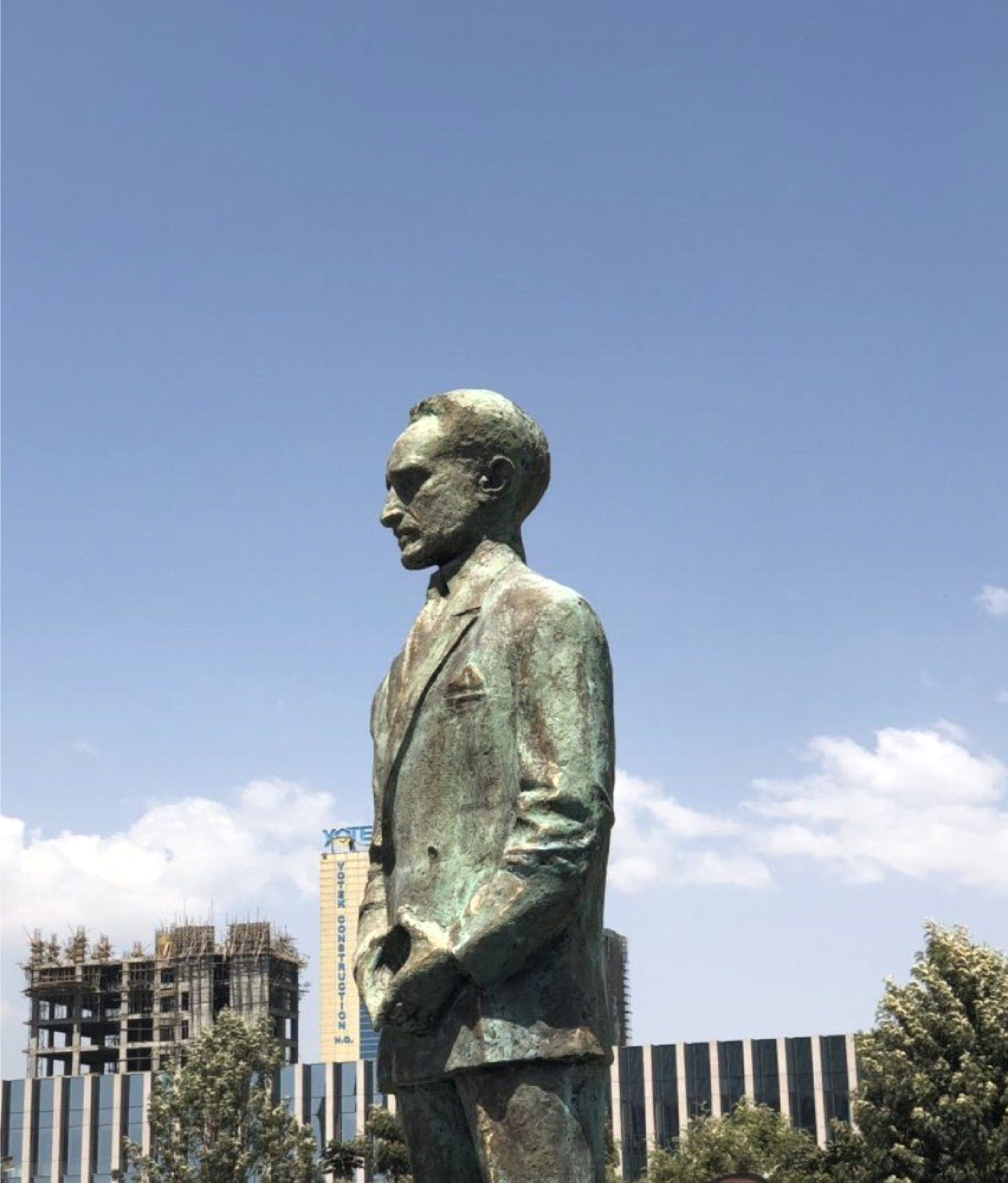 Takudzwa Hillary Chiwanza
Takudzwa Hillary Chiwanza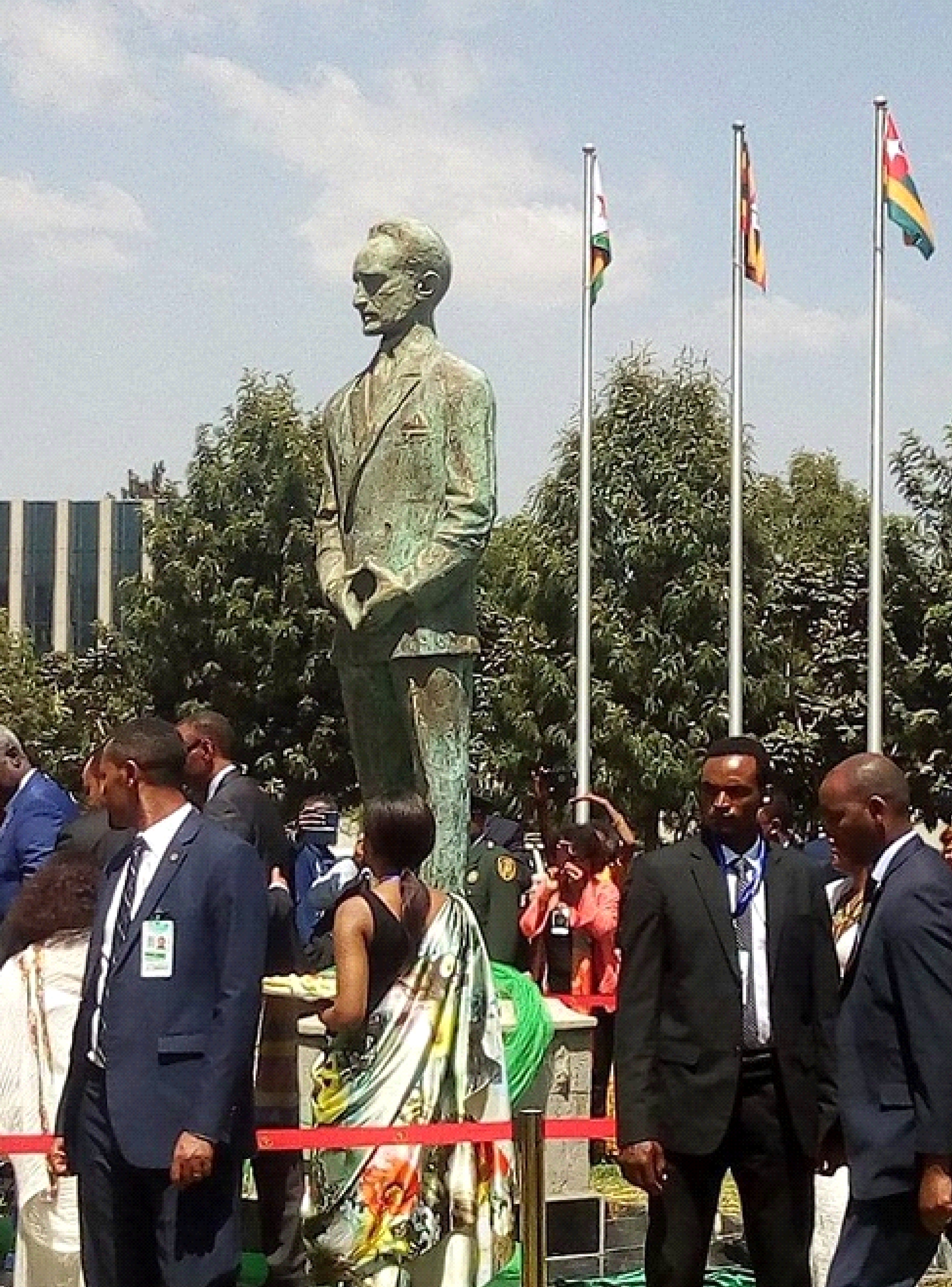 ⦁ In paying respect to Haile Selassie’s role in the formation of the African Union, his statue has been unveiled at the headquarters of the African Union in Addis Ababa, Ethiopia.
⦁ In paying respect to Haile Selassie’s role in the formation of the African Union, his statue has been unveiled at the headquarters of the African Union in Addis Ababa, Ethiopia.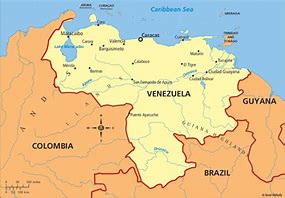 As the forces backing President Nicolas Maduro and National Assembly member and self-proclaimed president Juan Guaido continue to marshal their respective forces in their struggle to establish control of what can only be described as a divided Venezuela, and as the United States seems bent on coercing its allies in Canada and the right-wing nations of Latin America to support a policy of regime change in that country, the international community has increasingly voiced its opinion on the crisis. The extreme right seems to be represented by the Lima Group of Latin American nations, including the latest ally of US President Donald Trump in Brazil, in calling for the outright overthrow of what they term an “illegitimate” Maduro-led government, with support from the United States, Canada and a few European states. The left is largely represented by many academics who have signed open letters to the United Nations and the Organization of American States (OAS), such as Noam Chomsky, former leftist heads of state such as Dilma Rousseff of Brazil, a variety of Socialist governments (Russia, China) and several grassroots, revolutionary and Socialist organizations. The Organization of American States (OAS) and the Caribbean Community (CARICOM) seem to be in the middle, with OAS leaning toward backing Guaido and CARICOM, though divided itself between Guaido and Maduro, generally insisting in unison on a peaceful resolution to the crisis that listens to the people of Venezuela, respects the nation’s sovereignty and avoids bloodshed. Here, we will discuss some of the international community’s response, so far, to the Venezuela crisis.
As the forces backing President Nicolas Maduro and National Assembly member and self-proclaimed president Juan Guaido continue to marshal their respective forces in their struggle to establish control of what can only be described as a divided Venezuela, and as the United States seems bent on coercing its allies in Canada and the right-wing nations of Latin America to support a policy of regime change in that country, the international community has increasingly voiced its opinion on the crisis. The extreme right seems to be represented by the Lima Group of Latin American nations, including the latest ally of US President Donald Trump in Brazil, in calling for the outright overthrow of what they term an “illegitimate” Maduro-led government, with support from the United States, Canada and a few European states. The left is largely represented by many academics who have signed open letters to the United Nations and the Organization of American States (OAS), such as Noam Chomsky, former leftist heads of state such as Dilma Rousseff of Brazil, a variety of Socialist governments (Russia, China) and several grassroots, revolutionary and Socialist organizations. The Organization of American States (OAS) and the Caribbean Community (CARICOM) seem to be in the middle, with OAS leaning toward backing Guaido and CARICOM, though divided itself between Guaido and Maduro, generally insisting in unison on a peaceful resolution to the crisis that listens to the people of Venezuela, respects the nation’s sovereignty and avoids bloodshed. Here, we will discuss some of the international community’s response, so far, to the Venezuela crisis.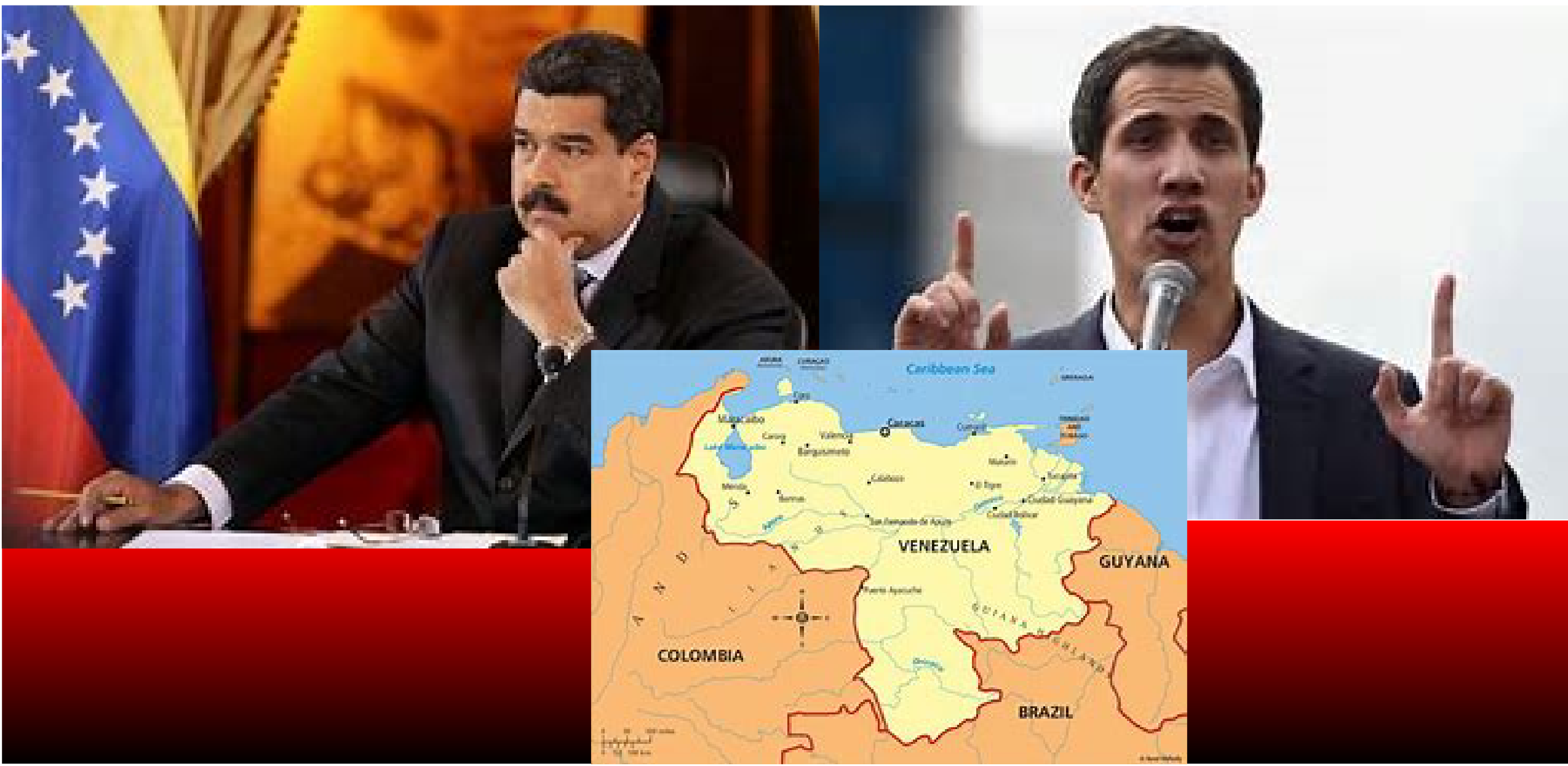 As a young , idealistic activist in Venezuela, Hugo Rafael Chavez Frias led two unsuccessful 1992 coup attempts against then-President Carlos Andres Perez, who was perceived as having broken promises to the people to resist neoliberal economic policies being pushed by the United States (US) and the International Monetary Fund (IMF). Chavez was freed two years later after Perez was impeached for his conduct as President, and his popularity rose until he won the presidency himself in 1998. Several anti-Chavez demonstrations, recall referenda and coup attempts by ideological foes would ensue, most famously the April 11-April 14, 2002 attempt by businessman Pedro Carmona in which Chavez agreed to be detained, and then saw popular support force Carmona to release Chavez and surrender. All of the subsequent coup attempts, referenda and other anti-Chavez actions would fail (with the exceptions of a few significant Constitutional ballot measures), apparently due to the underestimation of the people’s support and the charisma of “Chavismo”. Thus, the Bolivarian Republic of Venezuela was established and strengthened, a reference to Simon Bolivar (1783-1830), who opposed Spanish colonial powers and is widely revered across Latin America.
As a young , idealistic activist in Venezuela, Hugo Rafael Chavez Frias led two unsuccessful 1992 coup attempts against then-President Carlos Andres Perez, who was perceived as having broken promises to the people to resist neoliberal economic policies being pushed by the United States (US) and the International Monetary Fund (IMF). Chavez was freed two years later after Perez was impeached for his conduct as President, and his popularity rose until he won the presidency himself in 1998. Several anti-Chavez demonstrations, recall referenda and coup attempts by ideological foes would ensue, most famously the April 11-April 14, 2002 attempt by businessman Pedro Carmona in which Chavez agreed to be detained, and then saw popular support force Carmona to release Chavez and surrender. All of the subsequent coup attempts, referenda and other anti-Chavez actions would fail (with the exceptions of a few significant Constitutional ballot measures), apparently due to the underestimation of the people’s support and the charisma of “Chavismo”. Thus, the Bolivarian Republic of Venezuela was established and strengthened, a reference to Simon Bolivar (1783-1830), who opposed Spanish colonial powers and is widely revered across Latin America.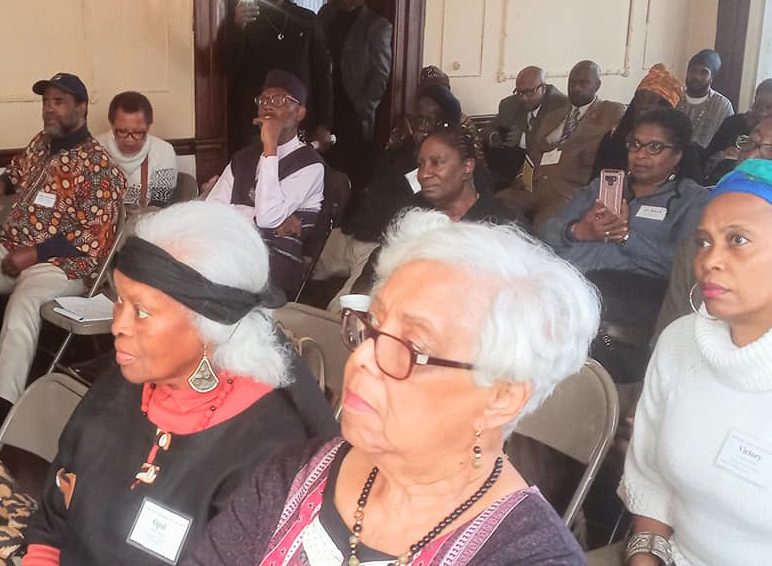 Too often at Pan-Afrikan conferences, when the discussion turns to issues of activism and revolutionary principles, the Brothers take to the podium and fill the air with grand pronouncements and militant fervor. Most of these speeches are indeed quite relevant, necessary even, but in the process the Sisters often tend to be left out, sitting in the audience as though their only purpose is to listen and not to offer their own viewpoints. I have been told something similar on many occasions by the Queen of our personal castle. And on Saturday, November 17, 2018, at the conclusion of the public Summit, I was told this again by a Sister in the audience who noticed that many of the remarks were, again, male-dominated despite our (apparently less-than-adequate) efforts. If there was one oversight of the 2018 Summit that I would correct, it is that a conscious, intentional effort was not sufficiently made to ensure that more Sisters had an opportunity to address the audience.
Too often at Pan-Afrikan conferences, when the discussion turns to issues of activism and revolutionary principles, the Brothers take to the podium and fill the air with grand pronouncements and militant fervor. Most of these speeches are indeed quite relevant, necessary even, but in the process the Sisters often tend to be left out, sitting in the audience as though their only purpose is to listen and not to offer their own viewpoints. I have been told something similar on many occasions by the Queen of our personal castle. And on Saturday, November 17, 2018, at the conclusion of the public Summit, I was told this again by a Sister in the audience who noticed that many of the remarks were, again, male-dominated despite our (apparently less-than-adequate) efforts. If there was one oversight of the 2018 Summit that I would correct, it is that a conscious, intentional effort was not sufficiently made to ensure that more Sisters had an opportunity to address the audience.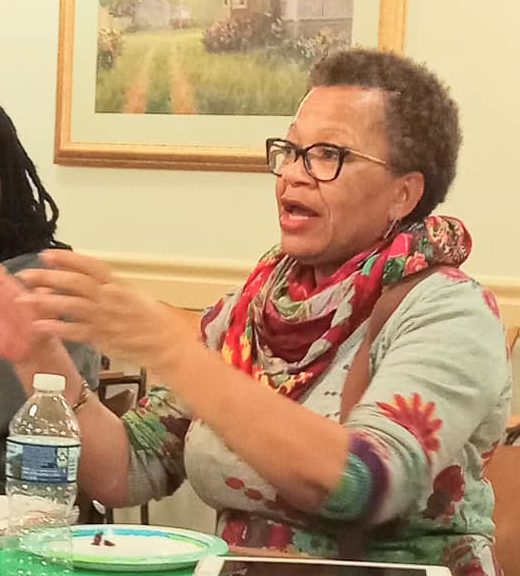 been a strong organizer for Reparations for Afrikan people, the ending of France’s political stranglehold on its colonies in the Eastern Caribbean (such as Guadeloupe and Martinique), and the organizing of the grassroots Afrikan communities there to force the international community to hear their voices. Having recently recovered from the devastation of the series of hurricanes that devastated her home as well as Puerto Rico and the Virgin Islands, she is now organizing for conferences and collaborative efforts between Afrikan activists to be held and directed from her home country. More time should have been reserved for her to make formal presentations at the public Summit event, though she was able to be directly involved in discussions with other Pan-Afrikan activists as part of SRDC’s work to build international coalitions on the way to re-establishing the Pan African Diaspora Union (PADU) on the global level.
been a strong organizer for Reparations for Afrikan people, the ending of France’s political stranglehold on its colonies in the Eastern Caribbean (such as Guadeloupe and Martinique), and the organizing of the grassroots Afrikan communities there to force the international community to hear their voices. Having recently recovered from the devastation of the series of hurricanes that devastated her home as well as Puerto Rico and the Virgin Islands, she is now organizing for conferences and collaborative efforts between Afrikan activists to be held and directed from her home country. More time should have been reserved for her to make formal presentations at the public Summit event, though she was able to be directly involved in discussions with other Pan-Afrikan activists as part of SRDC’s work to build international coalitions on the way to re-establishing the Pan African Diaspora Union (PADU) on the global level.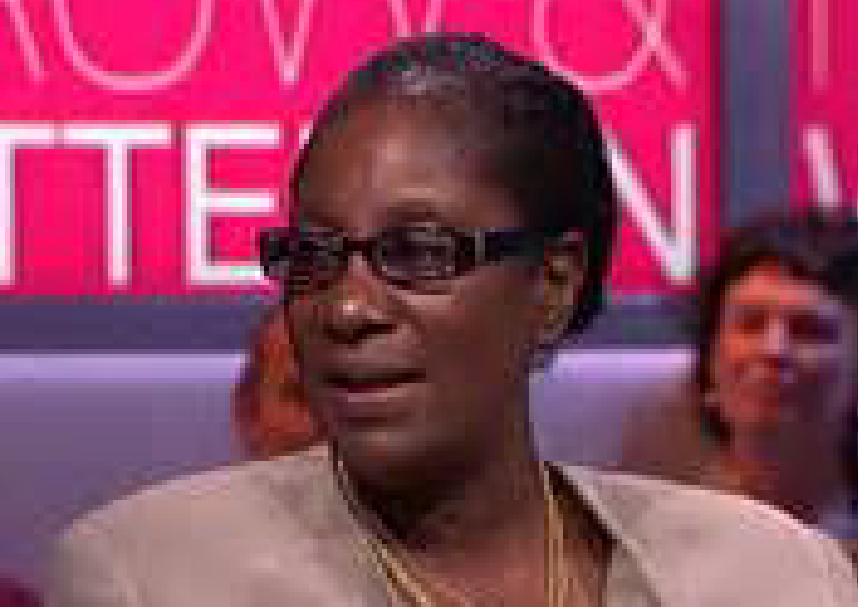 treats and toys to good little children, instead kidnaps “bad” little children and spirits them away from home, never to return. She works tirelessly to organize Afrikan populations in Europe to raise their collective voice in the African Union, as does Professor David Horne in the United States. She is in regular contact with Afrikan activists in Germany, the United Kingdom and Dimonas, Israel; indeed, Dr. Khazriel Ben Yehudah of the Afrikan Hebrew Israelites was also in attendance at the Summit, largely because she was there as well. She was among the Pan-Afrikan activists who participated in the 2001 World Conference Against Racism, Xenophobia and Related Intolerance (WCAR) in Durban, South Africa. Born in Suriname, she has worked for well over a decade in cooperation with SRDC to organize Afrikan people in Europe to establish their voice in the African Union as well as in the United Nations. In January 2015, she gave the keynote address at the official launch of the United Nations International Decade for People of African Descent, and has contributed to the efforts of the UN’s Working Group of Experts on People of African Descent, which she has continued to champion in the years since.
treats and toys to good little children, instead kidnaps “bad” little children and spirits them away from home, never to return. She works tirelessly to organize Afrikan populations in Europe to raise their collective voice in the African Union, as does Professor David Horne in the United States. She is in regular contact with Afrikan activists in Germany, the United Kingdom and Dimonas, Israel; indeed, Dr. Khazriel Ben Yehudah of the Afrikan Hebrew Israelites was also in attendance at the Summit, largely because she was there as well. She was among the Pan-Afrikan activists who participated in the 2001 World Conference Against Racism, Xenophobia and Related Intolerance (WCAR) in Durban, South Africa. Born in Suriname, she has worked for well over a decade in cooperation with SRDC to organize Afrikan people in Europe to establish their voice in the African Union as well as in the United Nations. In January 2015, she gave the keynote address at the official launch of the United Nations International Decade for People of African Descent, and has contributed to the efforts of the UN’s Working Group of Experts on People of African Descent, which she has continued to champion in the years since.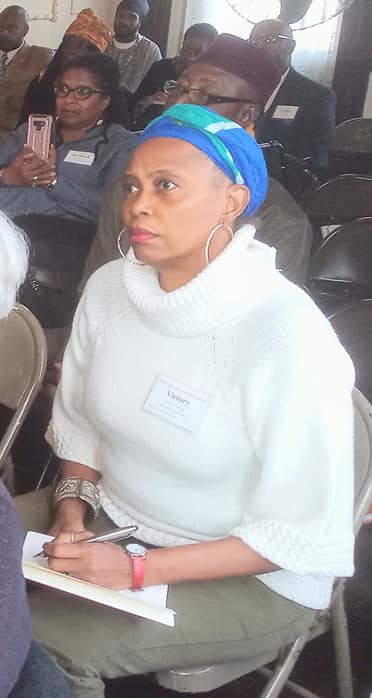 “All roads lead to Afrika,” she told the audience on Saturday, much as Mama Tomiko also said. “We have to be able to see the forest for the trees. Everything we’re doing collectively and individually leads us all back to the Motherland, leads us all back to the Continent. Everything we’re doing in Baltimore, whatever we’re doing in Seattle, whatever’s being done in Detroit, Ghana, Liberia, whatever is being done, the purpose of those efforts is for us to come together as a people and to reclaim our name, our culture and our land back. That is our purpose, and I don’t think any of us in this room are dismissed from that agenda. Am I correct? That is our agenda. And … we do need a collective focus on how to get our land back, but I think that we are all collectively doing what we’re doing wherever we’re doing it, so that all roads will lead back to Afrika.”
“All roads lead to Afrika,” she told the audience on Saturday, much as Mama Tomiko also said. “We have to be able to see the forest for the trees. Everything we’re doing collectively and individually leads us all back to the Motherland, leads us all back to the Continent. Everything we’re doing in Baltimore, whatever we’re doing in Seattle, whatever’s being done in Detroit, Ghana, Liberia, whatever is being done, the purpose of those efforts is for us to come together as a people and to reclaim our name, our culture and our land back. That is our purpose, and I don’t think any of us in this room are dismissed from that agenda. Am I correct? That is our agenda. And … we do need a collective focus on how to get our land back, but I think that we are all collectively doing what we’re doing wherever we’re doing it, so that all roads will lead back to Afrika.”

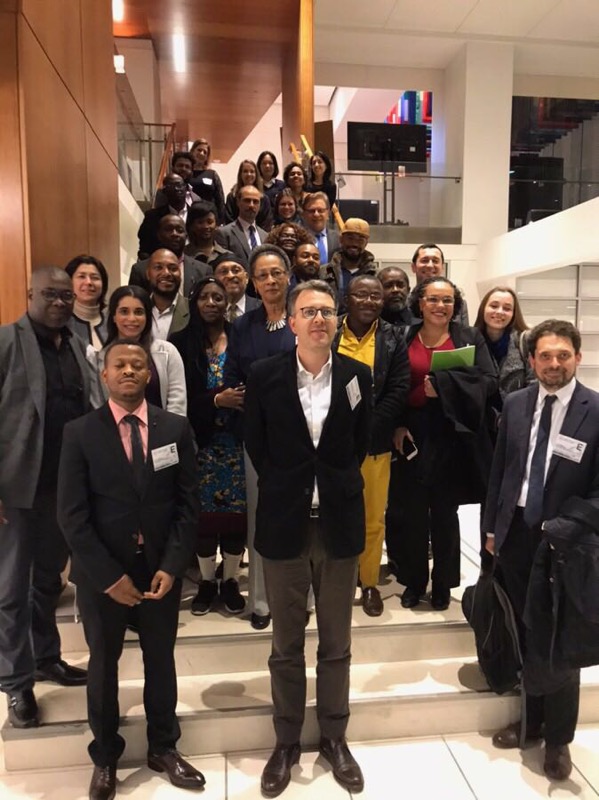

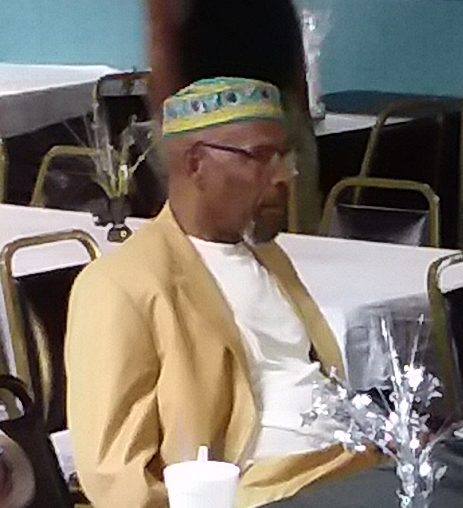 “In December of last year, the Sixth Region Diaspora Caucus pulled together some of us for what has come to be known as the Maryland Council of Elders. The Maryland Council of Elders consists of Brothers and Sisters from basically all walks of life and we were given a charge by the people who brought us into existence to choose one thing and do it well. It took us a while to examine the activities of the various organizations that made up our group, to find out what that one thing should be. We finally concluded that the best thing that we can do as Elders in a troubled community, is bring our people together. The best thing that we can do is forge unity among our organizations, among our community and among ourselves.
“In December of last year, the Sixth Region Diaspora Caucus pulled together some of us for what has come to be known as the Maryland Council of Elders. The Maryland Council of Elders consists of Brothers and Sisters from basically all walks of life and we were given a charge by the people who brought us into existence to choose one thing and do it well. It took us a while to examine the activities of the various organizations that made up our group, to find out what that one thing should be. We finally concluded that the best thing that we can do as Elders in a troubled community, is bring our people together. The best thing that we can do is forge unity among our organizations, among our community and among ourselves.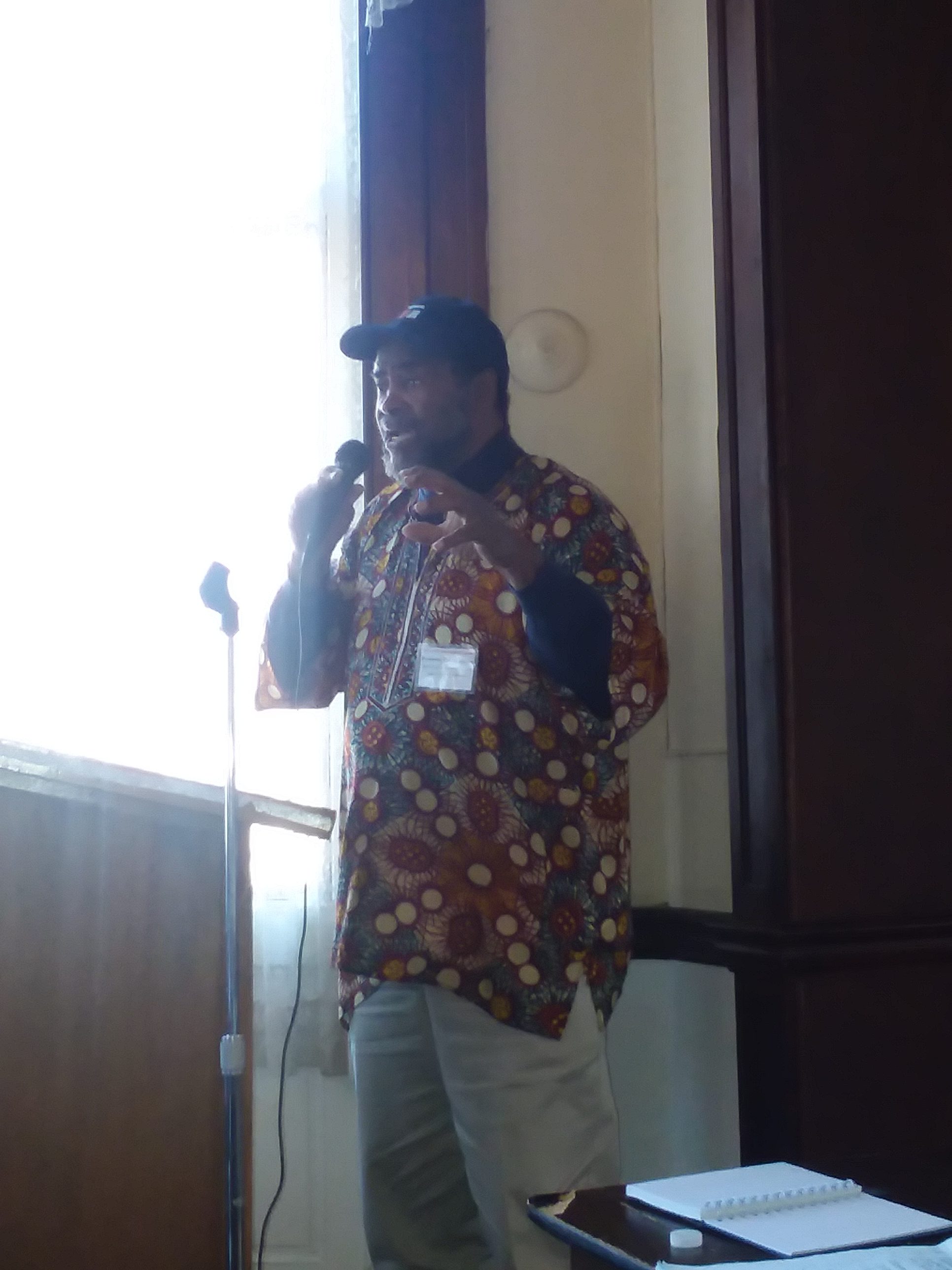 “Historically, everybody’s Afrikan. We all came from the Continent, even though White people don’t want to acknowledge it, even though they came from Afrika. We are the birthplace of mankind. Now, clearly, they don’t want to be Afrikan anymore, and we really don’t want them to be Afrikan anymore, because they don’t really represent us. But we who are Afrikan, whether we’re in Brazil, Suriname, Trinidad, Jamaica, Costa Rica, Nicaragua, Guatemala, Mexico, Baltimore, Los Angeles, no matter where we are, we are still Afrikan people. Israel — not all of Israel, just Dimonas — we are still Afrikan people, and part of our assignment, part of our reason for being here, in case we forget — and the Elder just reminded us of why we’re here, which is to have a discussion — but in case we forget why we’re here, it ain’t right. And it’s not going to be right until we correct it. Until we bring the balance back into the world. So, it may not be right before we leave this Earth, but it is our obligation to do everything we can in the short time that we can have to make sure we move it forward.
“Historically, everybody’s Afrikan. We all came from the Continent, even though White people don’t want to acknowledge it, even though they came from Afrika. We are the birthplace of mankind. Now, clearly, they don’t want to be Afrikan anymore, and we really don’t want them to be Afrikan anymore, because they don’t really represent us. But we who are Afrikan, whether we’re in Brazil, Suriname, Trinidad, Jamaica, Costa Rica, Nicaragua, Guatemala, Mexico, Baltimore, Los Angeles, no matter where we are, we are still Afrikan people. Israel — not all of Israel, just Dimonas — we are still Afrikan people, and part of our assignment, part of our reason for being here, in case we forget — and the Elder just reminded us of why we’re here, which is to have a discussion — but in case we forget why we’re here, it ain’t right. And it’s not going to be right until we correct it. Until we bring the balance back into the world. So, it may not be right before we leave this Earth, but it is our obligation to do everything we can in the short time that we can have to make sure we move it forward. 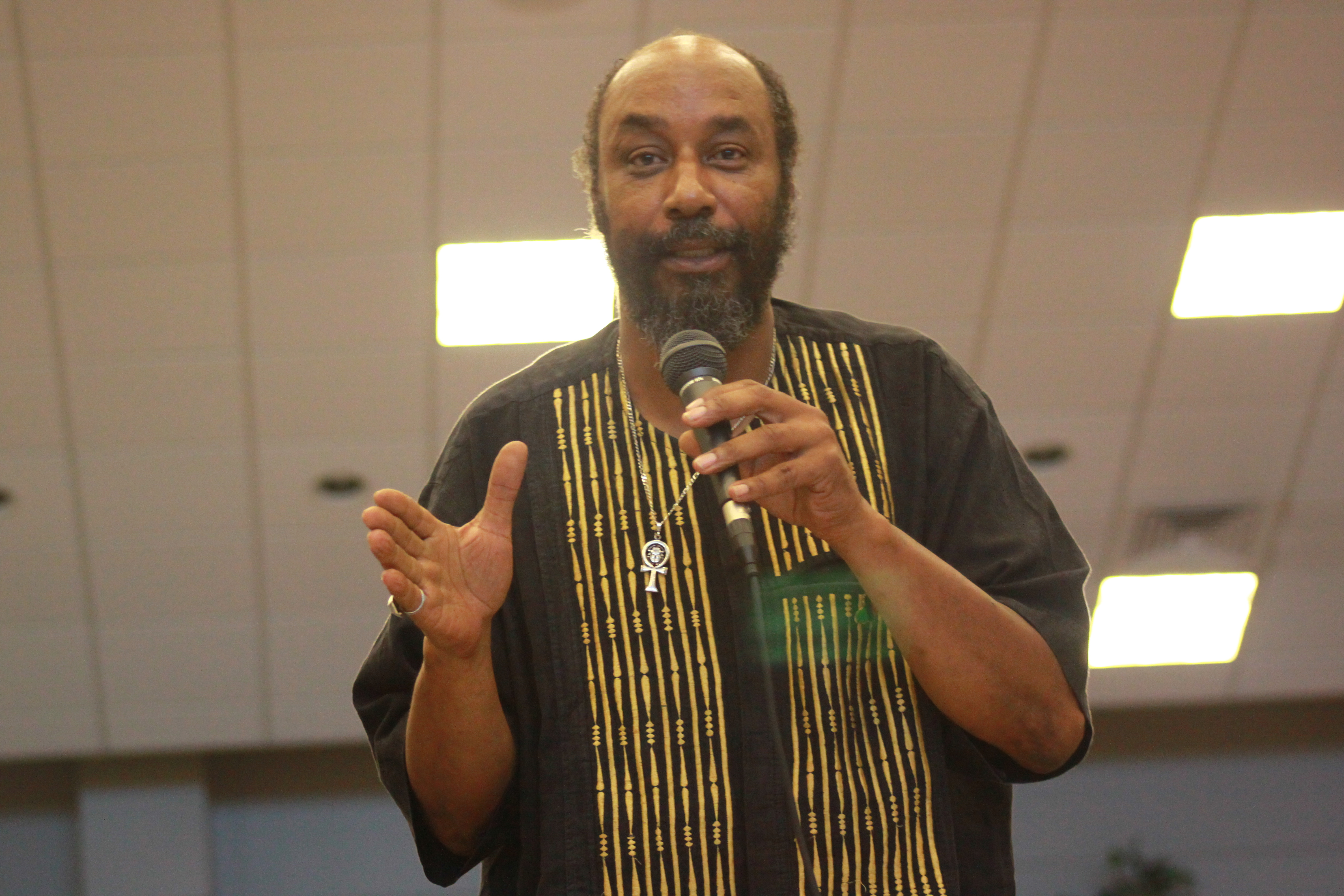 “First of all, this [Professor Horne] is my Brother here, and when we say SRDC, I’m with that. We worked with the UNIA for many years and are still with the UNIA. He served as International Organizer, I served as President-General. But I want my Brother to understand that there’s a movement taking place. Not in an organization, but a grassroots global movement, called the Pan African Federalist Movement. The head of the Regional Initiating Committee of North America will be here tomorrow. But I’m very much involved with that movement on the international, national and local level. So what I want you to understand, if we’re talking about people under 39, they are rising up. But they need the wisdom of those of us that know what has been going on, and know what can go on if we don’t do what we’re supposed to do. So all these [competing] movements we’re talking about, we’ve got a movement coming.
“First of all, this [Professor Horne] is my Brother here, and when we say SRDC, I’m with that. We worked with the UNIA for many years and are still with the UNIA. He served as International Organizer, I served as President-General. But I want my Brother to understand that there’s a movement taking place. Not in an organization, but a grassroots global movement, called the Pan African Federalist Movement. The head of the Regional Initiating Committee of North America will be here tomorrow. But I’m very much involved with that movement on the international, national and local level. So what I want you to understand, if we’re talking about people under 39, they are rising up. But they need the wisdom of those of us that know what has been going on, and know what can go on if we don’t do what we’re supposed to do. So all these [competing] movements we’re talking about, we’ve got a movement coming.